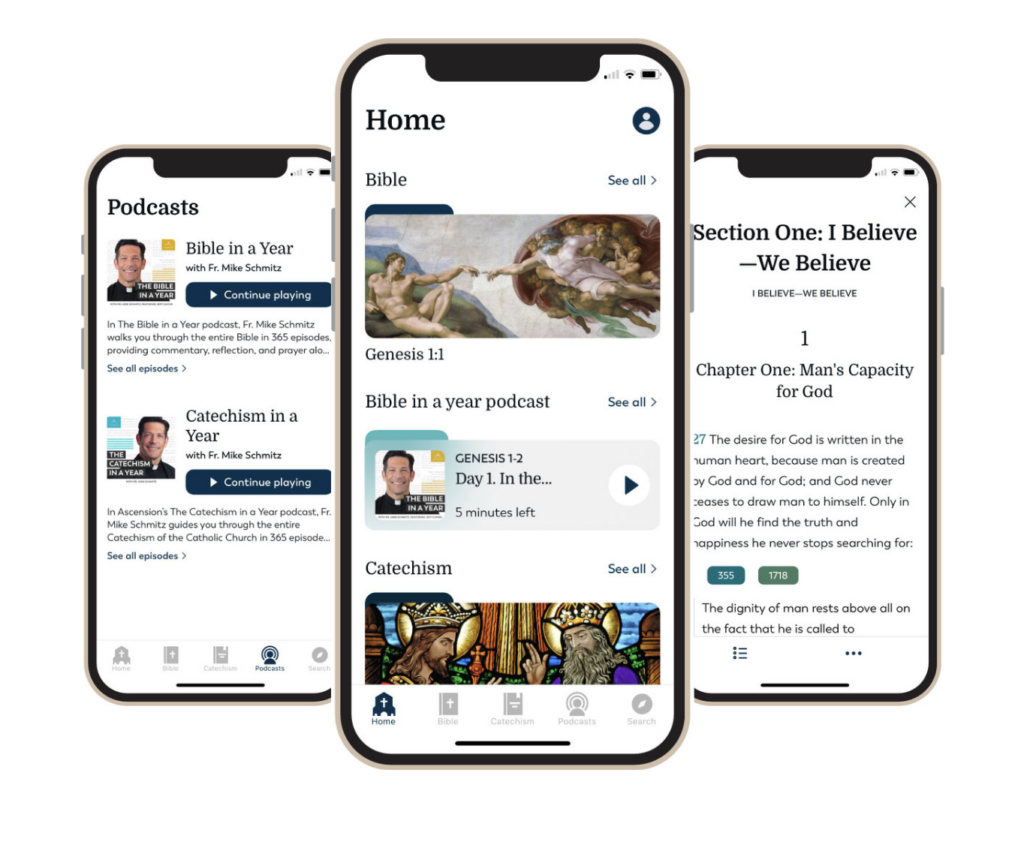The Bible is God’s love letter to us, and it is full of fascinating stories, events, and people. Catholic parents understandably want their children to read and understand Scripture so that they can appreciate the amazing story of salvation history. Rooted in this story, your children’s faith will grow and flourish. Their prayer life will become more fruitful, they will be able to enter more deeply into the Mass, and they will become more obedient to God’s will. (They may even listen to you as well!)
Encouraging your kids to enter into the Word of God can be challenging, however. A common question from parents is, “How can I get my kids to listen when I read the Bible to them?” Their blank stares make you think God’s saving words have gone in one ear and out the other. They can be distracted, seem disinterested, or act silly. Here are a few suggestions that might help.
Before I do, though, maybe you are saying to yourself, “There is just no way my kids are going to sit still and listen for that long.” Young children have a lot of energy, and when they get bored this energy becomes the enemy of listening. The key word here is “bored.” If you are reading your child a story, do they listen? You bet! The Little Engine that Could. The Cat in the Hat. Jack and the Beanstalk. Share a story with them and they pay attention for a simple reason: it isn’t boring.
Ready to start reading the Bible to your kids, but wish you had a done-for-you Bible reading plan to make it easy?
Download The Great Adventure Reading Plan for Kids today!
That is the power of a story. According to Donald Miller, “The average person spends thirty percent of their time daydreaming. But when you put them in a movie theater, they stop daydreaming for the next ninety minutes. The movie does the daydreaming for them.” When you use the power of a story—like what you will share with them in the Bible—their brains are wired to stop daydreaming and listen.
Don’t wait! Begin reading the Bible to your children, and often. Every day, they are exposed to messages, some good and some bad. The media and the Internet are bombarding them with information. The best way to help them resist the constant push and pull of those messages is to ground them in the firm, unchanging truth of God’s Word. That solid foundation will help them to stand up to the whirlwind of competing messages the world will throw at them throughout their lives.
With this in mind, here are some strategies to help your children listen when you share stories from the Bible with them:
- Set up an environment so that it is conducive to listening. No TV, video games, tablets, or smartphones. Though some quiet instrumental music or Gregorian chant can be helpful in keeping kids focused.
- Establish expectations. Explain in simple words what you will be doing. Let them know when you move to a new story.
- Reinforce good listening skills by affirming them when they listen. Praise them for their efforts.
- Show them, by your own example, how to be a good listener. Make eye contact with them when they talk to you. Listen quietly and allow them to speak. Ask brief, clarifying questions and repeat back to them what you heard them say. Your consistent example will go a long way towards helping them become good listeners as well.
Try a couple of these strategies in the next week with your children. See if there is improvement. When you experience success, keep at it in the weeks and months ahead. Consistency is important when you teach your kids new skills, particularly how to listen. As they practice listening to Scripture on a regular basis, attentive listening will become a lifelong habit.
Reading the Bible to your children can be challenging. It takes a lot of patience. However, the benefits far outweigh the struggles because you are imparting a significant life skill that will serve them all through their lives.
Ready to start reading the Bible to your kids, but wish you had a done-for-you Bible reading plan to make it easy?
Download The Great Adventure Reading Plan for Kids today!

It’s Here: The Bible & Catechism App!
The word of God and the complete teachings of the Catholic Church. Answers and commentary by Fr. Mike Schmitz, Jeff Cavins, and other experts. Video, audio, and textual commentary. Right on your phone.
You May Also Like:
Why Study the Bible?
Keeping Kids Catholic [Audio]
Passing the Faith On to Your Kids [Jackie and Bobby Video]

Lisa Bromschwig holds a Masters Degree in Pastoral Ministry from the St. Paul Seminary School of Divinity. She has worked in parish Faith Formation for more than ten years and is a co-author of the GPS: God’s Plan in Scripture program for children. Lisa and her husband Kurt live in Texas.






0 Comments